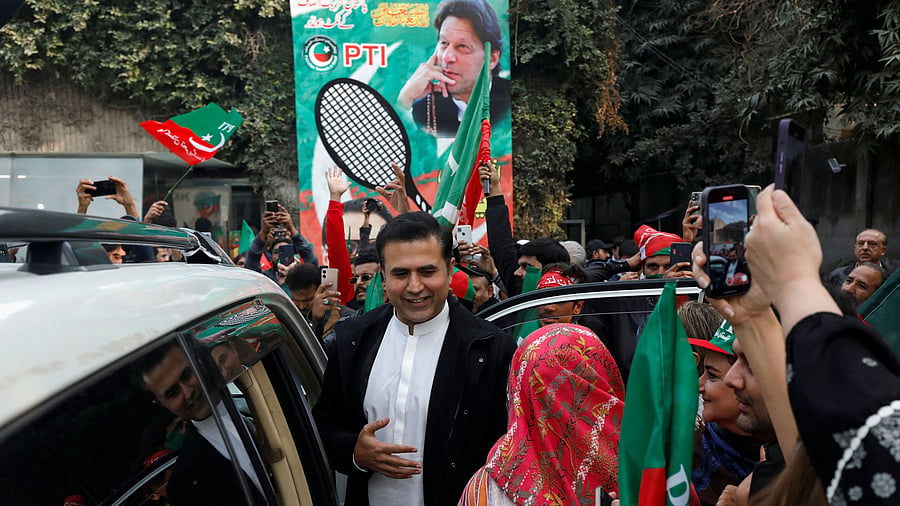
Supporters and party workers of former Prime Minister Imran Khan gather during a rally ahead of the general elections in Lahore.
Credit: Reuters Photo
By Mihir Sharma
This week, Pakistanis will go to the polls to elect a new National Assembly. The last vote, in the summer of 2018, took place under controversial circumstances: The country’s powerful military was generally perceived to have put its hefty thumb on the electoral scales in order to elevate its preferred candidate, former cricket star Imran Khan. Khan’s main rival, former three-time Prime Minister Nawaz Sharif, had been kicked out of office and sent to jail for corruption.
Not much has changed. Except, this time, it is Khan who was kicked out of office in 2022 and packed off to jail for alleged graft. He continues to face dozens of additional criminal charges, of wildly varying importance and credibility. While his status as “prisoner no. 804” in Attock jail had already disqualified him from running, last week — as if to lock and triple-lock his cell — he was convicted in three more cases: one for corruption, one for leaking state secrets, and one for marrying his third wife in an “un-Islamic” manner.
Khan’s supporters are pardonably outraged at what they see as a concerted effort by the political opposition, the judiciary, and the military to keep their firebrand leader out of office. It is harder for them to recognize that it was the judiciary and the military that propelled him into office in the first place, two decades after he had launched a political career notable mostly for heartfelt anti-Americanism and repeated electoral failure.
Meanwhile Sharif — whose brother, Shehbaz, served as prime minister for 16 months between Khan’s expulsion and the advent of a pre-election caretaker government — is hoping for a fourth stint in government. If the generals are indeed backing him, then that is something of a triumph of hope over experience. Sharif’s previous terms as prime minister all ended with the military pushing him out, on one occasion through a coup d’etat.
The generals should also have learned by now — from Sharif’s longevity, if nothing else — that you only further boost a Pakistani leader’s career by trying to remove him or her from the political process. Certainly, it is hard to argue that Khan is personally less popular for having been thrown in jail. If anything, his imprisonment has fed into the narrative of martyrdom that he had already been constructing for popular consumption.
Sharif has built his campaign around the economy, arguing that Khan’s mismanagement brought the country close to a crisis. Certainly, Sharif’s far less bombastic brother spent most of his time in office managing one disaster after another, from an unsustainable current-account deficit to devastating floods that killed almost 2,000 and cost the country billions.
The government has not yet controlled inflation — which hovers between 20 per cent and 30 per cent — nor eliminated the deficit. Still, its management since Khan left office has been sensible enough to satisfy the International Monetary Fund. That is crucial because Islamabad continues to need cash from the IMF to postpone a balance-of-payments crisis and retain the confidence of its creditors.
The hard work of reforming Pakistan’s economy, however, remains to be done. Most important is raising the country’s tax-to-GDP ratio, which languishes at around 10 per cent and is too low to fund basic services. The World Bank estimates that bold reform could generate more than 12 per cent of GDP in additional fiscal space. That could help finance the investment in human capital and infrastructure that Pakistan desperately needs to improve its competitiveness and increase its ability to pay for imports, especially of energy.
Reforms such as these are conceptually obvious but politically difficult. That’s why investors worry that whoever wins this election won’t be seen as entirely legitimate. If Sharif wins, then whatever government he forms will be hobbled from the start by accusations that its mandate was at least in part a gift from the military. And if Khan’s supporters somehow triumph, they will have to form a government without him and likely in conjunction with other parties, which won’t be popular with either his voters or the establishment.
Under these circumstances, political jostling will not stop once the elections are over. But Pakistan cannot afford to let that hold up essential economic reforms. The winners and losers should at least find tacit agreement on a minimum reform program which could be launched, perhaps, by an apolitical finance minister. Otherwise, the main casualty will be Pakistan’s economic prospects.